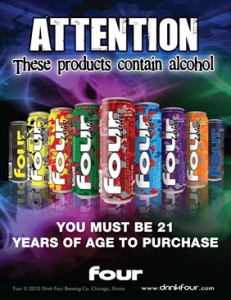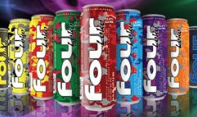Nine college students at Washington State University got sick, passed out and were hospitalized late last month after consuming the highly-caffeinated, alcoholic drink Four Loko, also known as “blackout in a can,” according to university officials.
After this event, Michigan banned Four Loko and all other alcoholic energy drinks from being sold in the state. Utah has also banned all alcoholic energy drinks.

One 23.5-ounce Four Loko energy drink contains 12 percent alcohol, which is roughly equivalent to drinking five 12-ounce beers and a cup of coffee.
“It’s extremely dangerous to mix energy drinks with alcohol,” health and human performance professor Christine Meyer-Jax said. “It can have harmful effects on blood pressure and give a false sense of sobriety, leading to increased consumption of alcohol and its dangerous side effects.”
Senior Jake Latzka said he only drinks Four Loko energy drinks on the weekends. He also said that they have become popular this year, and he knows many students who drink them.
Senior Susan Ray said she has tried a Four Loko before.
“I only drank one, but if I had drank more than that, it would have seriously conquered me,” she said. “I’m not really a caffeine fiend like most college kids.”
Caffeine crackdown
This month, some university and college administrators around the country are considering filing suits against alcoholic energy drink manufacturers or completely banning all alcoholic energy drinks.
Late last year, the Food and Drug Administration sent letters to nearly 30 manufacturers responsible for more than 40 alcoholic energy drinks requesting reports to prove their products are safe. The FDA is still researching the safety of the drinks.
Latzka said he thinks a ban is ridiculous.
“Just because [WSU students] weren’t smart about drinking them is no reason everyone else should have to suffer,” he said.
He said that if mixing caffeine with alcohol is such a big health risk, then many people are putting themselves at risk when they drink any mixture of caffeinated beverages with alcohol, not just by drinking alcoholic energy drinks.
Too much caffeine?
In addition to drinking caffeinated alcoholic beverages, Meyer-Jax said consuming large quantities of caffeine in coffee or other beverages can be problematic.
“It is true that a person can become dependent on caffeine over time,” she said. “What becomes troubling is that your body can adapt to a certain level of caffeine and you can build up a tolerance to it.”
Senior Kate Hallock said many students don’t view caffeine as dangerous.
“I don’t think college students see caffeine as a drug,” she said. “They see it as a way to help them stay alert and awake.”
Junior Sameer Adam said he buys caffeine on campus to help him get through his late-night study sessions, which he refers to as his “weekly all-nighters.” Health and human performance assistant professor Dan Carey said college students aren’t the only ones who overdo it when it comes to caffeine.
“Besides coffee, there is caffeine in chocolate products and soft drinks,” he said. “If you add it all together, many people, not just students, are consuming too much caffeine.”
Caffeine campus
Senior Ellie Schroeder has worked in the C-Store for four years and said she has seen her share of students stocking up on caffeine products.
“I see people come in and buy two energy drinks and one five-hour energy each,” Schroeder said. “As a health major, it is funny to see students buying 5-hour energy. I don’t think they are even FDA-approved.”
Schroeder said she has sold more energy drinks and 5-hour energy shots than anything else containing caffeine in the C-Store.
Meyer-Jax said she would like to see warning labels on energy drink products because she thinks many young people don’t understand the potential consequences of high caffeine intake or the ingredients in what they are consuming.
“This is really the first generation of young people that have been exposing themselves to these energy drinks,” Meyer-Jax said. “I believe we will start to see research showing the effects of habitual consumption on health in the next few years.”
Whether it’s coffee, tea, energy drinks or Four Loko, there can be risks involved in high caffeine consumption, she said.
“I think it’s important to start educating our nation’s youth on this topic to help them make informed choices,” she said.
Ariel Kendall can be reached at akendall@stthomas.edu.

